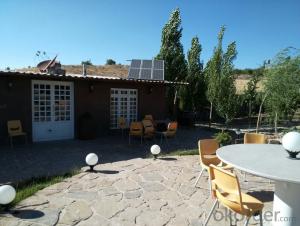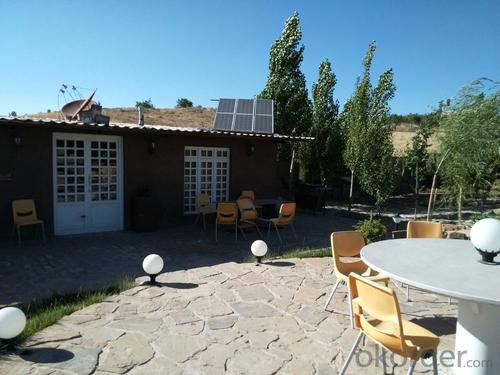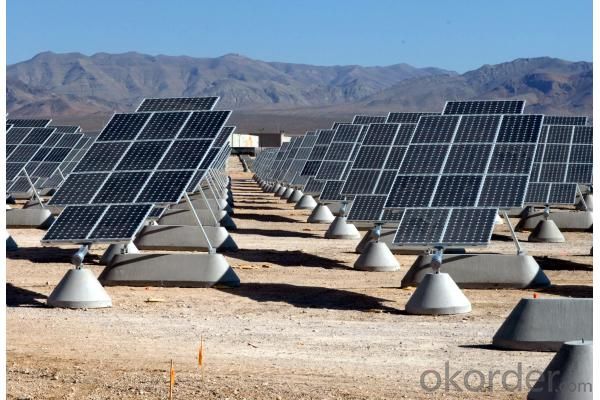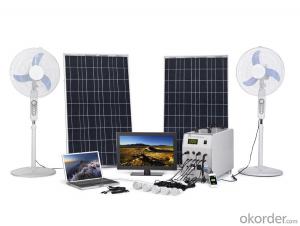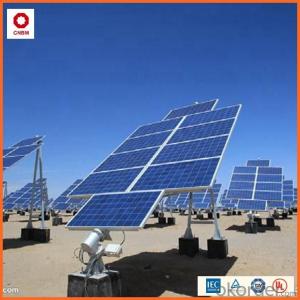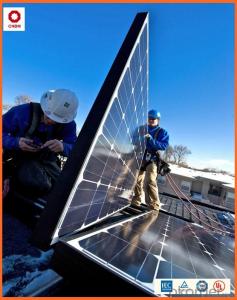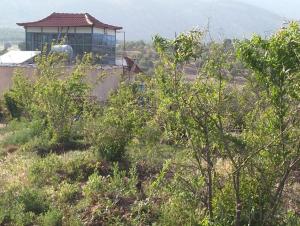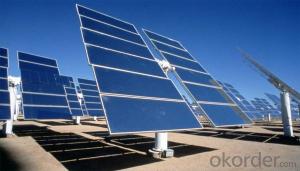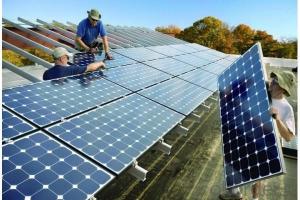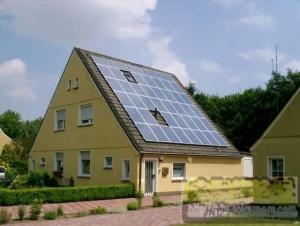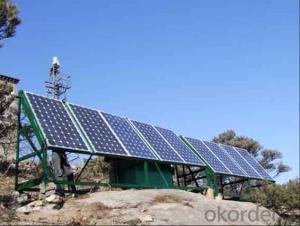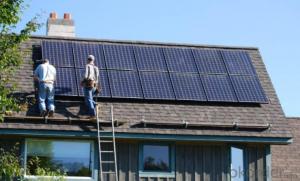La Union Solar Energy Systems - Off-Grid Solar Power System 4kw High Efficiency
- Loading Port:
- China main port
- Payment Terms:
- TT OR LC
- Min Order Qty:
- 1 pc
- Supply Capability:
- 10000 pc/month
OKorder Service Pledge
OKorder Financial Service
You Might Also Like
1.Description of Product
Off-Grid Solar Power System is consisted of solar panel, solar charge controller, inverter, battery, mounting rack and cables.
(1).Grid-connected, send power to city grid
(2).MPPT technology, wide range of working voltage
(3).Simply Wiring, easy installation, customized design for your projects
(4).Low investment & long term feedback
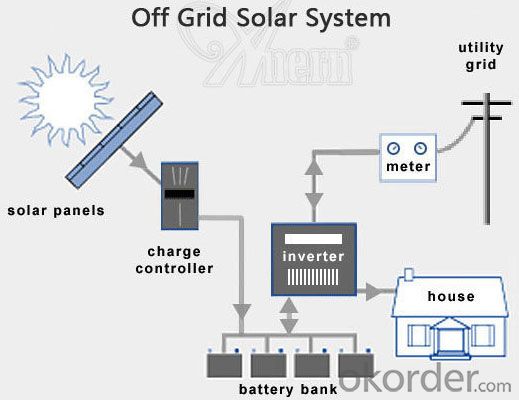
2. Off-Grid Features
1. Off grid solar power system is mainly used for application with relatively-small power consumption, and the areas have no grid network coverage, or grid power is unstable or outage condition.
2. It’s composed of solar panels, hybrid solar inverter, battery bank, solar panel mounting racks, and other accessories required fora complete home solar power system.
3. The battery bank gives a stable power output to the solar inverter which converts DC to AC to power loads, and provides power backup in rainy or cloudy days.
4. The solar panels generate electricity at daytime and charge the battery bank .
5. The off grid home solar power system provides grid power bypass in case of battery power shortage when sunshine is not enough.
6. All the off grid home solar power system configurations are worked out by scientific calculation and design.
Ref No. | 4KW |
Solar Panel | Type: Monocrystalline Silicon PV Module Max Power: 250W QTY:12 pcs |
Controller-Inverter Integrator | Rated Ouput Power: 4000W Rated DC Voltage: 48V QTY:1 pcs |
Battery | 12V/150AH per piece QTY:12 pcs |
Solar Panel Rack | Roof type mounting rack, anodized aluminum material, including complete fittings (Other type of racks can be customized as per client's requirement) QTY:1 pcs |
Cables | International standard, with specification suitable for solar system, BV1*10 QTY:80m |
3.The Pictures of Product
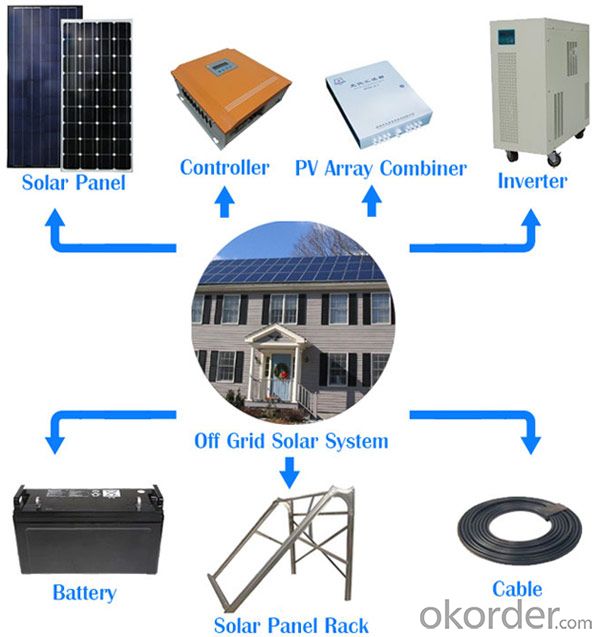
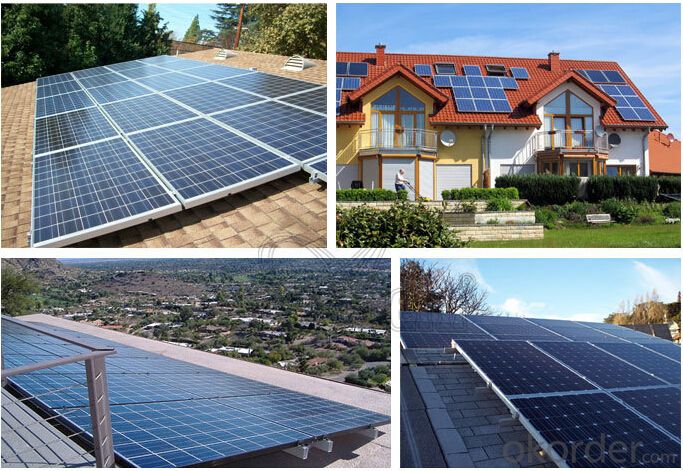
4.FAQ
Q1: What is the business type for the company?
A1: We are one of the biggest manufacturers inBejing.Chnia. Which is a high tech PV enterprise dedicated to the research, development, production and sales..
Q2: How long solar panel warranty can you offer?
A2: 10-Year product warranty,25-year linear power output warranty
If there is any quality problem, we will pay for freight and send free parts to you.
Q3: How many certificates do you have?
A3: We have 16 certificates,such as CE, TUV, UL, and so on.
Q4: Can I be the agent for you?
A4: Yes,We can discuss some information.
Q5: How to get a sample?How can cooperation with us
A5: contact us now.
- Q: Are there any noise concerns associated with solar energy systems?
- Noise concerns may arise when using solar energy systems, though they are generally quiet. One of the main sources of noise is the inverter, which converts DC electricity from the panels into AC electricity for use. The inverter may emit a low humming noise, similar to that of a fridge or AC unit. However, the noise level is typically very low and not considered disruptive. Fortunately, advancements in technology have led to the development of quieter inverters that produce minimal noise. Some inverters have noise reduction features like soundproof enclosures or low-noise fans. Additionally, the location of the inverter can help minimize noise concerns. Placing it in a well-insulated area, away from living spaces, can further reduce potential noise disturbances. It's important to note that other components of a solar energy system, such as mounting structures and wiring, do not generate significant noise. Solar panels themselves are noiseless as they rely on sunlight for electricity generation, without any moving parts. In conclusion, while certain components of solar energy systems may have noise concerns, advancements in technology and proper installation practices have greatly reduced potential disruptions.
- Q: Can solar energy systems be used in areas with high levels of electromagnetic radiation?
- Yes, solar energy systems can be used in areas with high levels of electromagnetic radiation. Solar panels convert sunlight into electricity by utilizing the photovoltaic effect, which is not affected by electromagnetic radiation. However, it is important to note that excessive electromagnetic radiation may cause interference with the electrical components of the solar system, potentially reducing its efficiency. Therefore, proper shielding and grounding measures are crucial to protect the system from any potential damage or interference. Additionally, it is advisable to conduct a thorough site assessment and consult with experts to ensure that the solar energy system can operate optimally in areas with high levels of electromagnetic radiation.
- Q: Can solar energy systems be used in powering construction sites or temporary structures?
- Solar energy systems are certainly capable of powering construction sites or temporary structures. In fact, the utilization of solar power in these situations is growing due to its many advantages. To begin with, construction sites often lack access to conventional power sources, making solar energy a practical solution. Solar panels can be easily installed on rooftops, scaffolding, or even on the ground, providing a dependable source of electricity throughout the construction process. Moreover, solar energy systems offer flexibility in power generation. They can be tailored to meet the specific energy demands of construction sites, whether it be for powering tools, lighting, or charging equipment. This adaptability ensures that construction activities can proceed seamlessly without any disruptions. Additionally, solar energy systems are environmentally friendly. By harnessing energy from the sun, construction sites can significantly reduce their carbon footprint and contribute to sustainable practices. Solar power does not generate harmful emissions or noise pollution, which is particularly advantageous in urban areas or sensitive environments. Furthermore, solar energy systems provide long-term cost savings. Although the initial investment for installing solar panels might be higher compared to traditional generators, the ongoing operational costs are substantially lower. Construction sites can benefit from reduced fuel expenses, maintenance costs, and a reduced reliance on fossil fuels. It is worth noting that solar energy systems can also be utilized for temporary structures such as mobile offices, portable restrooms, or event venues. These structures can be conveniently powered using solar panels, eliminating the need for generators or grid connections. In conclusion, solar energy systems are a practical and sustainable choice for powering construction sites and temporary structures. They offer reliable, customizable, and cost-effective power solutions while minimizing the impact on the environment. As the global shift towards renewable energy continues, solar power is likely to become even more prevalent in the construction industry.
- Q: Can solar energy systems be used in powering retirement homes or assisted living facilities?
- Retirement homes and assisted living facilities can indeed utilize solar energy systems to power their operations. These facilities face a substantial energy demand for heating, cooling, lighting, and electrical appliances. However, by installing solar panels on rooftops or suitable areas, these facilities can generate their own electricity and decrease their dependence on the grid. The implementation of solar energy systems offers significant advantages for these establishments. One notable benefit is the potential for substantial cost reduction, as solar power can offset a significant portion of their electricity bills. This aspect is especially crucial for retirement homes and assisted living facilities, which operate on limited budgets and must allocate resources efficiently. By harnessing solar power, these facilities can redirect the saved funds toward providing enhanced care and services for their residents. Moreover, solar energy systems contribute to a cleaner and more sustainable environment. Retirement homes and assisted living facilities bear a responsibility to promote their residents' well-being, and the utilization of solar power enables them to reduce their carbon footprint. This environmentally friendly approach can positively impact the health and overall quality of life for the residents. Additionally, solar energy systems serve as a reliable power source during emergencies or power outages. In areas prone to extreme weather events, where power disruptions are frequent, having a solar energy system with battery storage ensures a continuous and uninterrupted power supply to critical areas such as medical equipment, lighting, and HVAC systems. In conclusion, solar energy systems offer a feasible and advantageous solution for powering retirement homes and assisted living facilities. These systems can significantly decrease operating costs, promote sustainability, and provide a reliable power source, ultimately enhancing the quality of care and services provided to residents.
- Q: Can solar energy systems generate power at night?
- No, solar energy systems cannot generate power at night as they rely on sunlight to produce electricity.
- Q: Can solar energy systems be used in areas with high snowfall?
- Yes, solar energy systems can be used in areas with high snowfall. While snow can temporarily reduce the efficiency of solar panels, it does not completely hinder their functionality. Additionally, the panels are typically installed at an angle that allows snow to slide off, and advancements in technology have made them more resistant to snow accumulation. Regular maintenance, such as clearing snow off the panels, can ensure optimal performance in snowy conditions.
- Q: Can solar panels be installed on RVs or boats?
- Solar panels can be installed on both RVs and boats, offering a sustainable and efficient way to generate electricity while on the move. These panels are increasingly popular and provide a reliable power source for various appliances and equipment used in RVs and boats, including lights, fans, refrigerators, and electronic devices. Typically mounted on the roof or deck, the panels capture sunlight and convert it into usable energy. This enables RV and boat owners to decrease their reliance on traditional power sources, granting them the freedom to explore remote areas without the need for electrical hookups. Furthermore, solar panels on RVs and boats contribute to environmental preservation by reducing carbon emissions. Nevertheless, it is crucial to consider power requirements and available space before installation, as well as ensuring proper maintenance and installation for optimal efficiency and durability.
- Q: Can solar energy systems be used in powering agricultural processing facilities?
- Solar energy systems have the capability to power agricultural processing facilities. Photovoltaic (PV) panels, for instance, are able to generate electricity by harnessing sunlight. This generated electricity can then be utilized to operate various electrical equipment and processes within agricultural processing facilities. This includes the ability to power machinery used for cleaning, sorting, and packaging agricultural products, as well as running heating, ventilation, and air conditioning systems. To ensure a consistent and uninterrupted power supply, solar energy systems can also be combined with battery storage solutions. This integration allows for a reliable power supply, even during periods of limited sunlight or during nighttime. Furthermore, employing solar energy to power agricultural processing facilities helps decrease dependence on fossil fuels, reduces greenhouse gas emissions, and contributes to a more sustainable and environmentally friendly operation.
- Q: How does the efficiency of solar panels vary across different installation locations?
- The efficiency of solar panels varies across different installation locations due to various factors such as the amount of sunlight received, the angle and orientation of the panels, shading, temperature, and local weather conditions.
- Q: What is the role of solar energy in achieving energy independence?
- The role of solar energy in achieving energy independence is crucial. Solar power is a renewable and abundant source of energy that can be harnessed to generate electricity and heat. By utilizing solar energy, nations can reduce their reliance on fossil fuels and imported energy sources, thereby achieving greater energy independence. Solar panels installed on rooftops, in fields, and in solar farms can produce clean and sustainable electricity, reducing the need for traditional power plants. Additionally, solar energy can be utilized in off-grid areas, allowing communities to generate their own power and become self-sufficient. Overall, solar energy plays a vital role in diversifying energy sources, reducing greenhouse gas emissions, and ensuring a more sustainable and independent energy future.
Send your message to us
La Union Solar Energy Systems - Off-Grid Solar Power System 4kw High Efficiency
- Loading Port:
- China main port
- Payment Terms:
- TT OR LC
- Min Order Qty:
- 1 pc
- Supply Capability:
- 10000 pc/month
OKorder Service Pledge
OKorder Financial Service
Similar products
Hot products
Hot Searches
Related keywords
